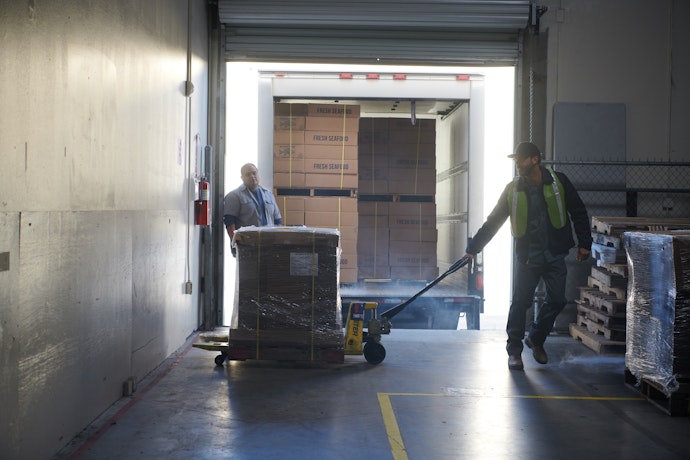Most Frequently Asked Questions About ELDs...
With the introduction of ELDs, new drivers will actually need less training, since there is no requirement for them to...
Read more
August 20, 2019
The U.S. Food and Drug Administration (FDA) Food Safety Modernization Act (FSMA) makes shippers and motor vehicle carriers and loaders responsible for maintaining proper temperatures and sanitary conditions for food transportation within the United States, with the aim of preventing foodborne illness across the national food system. The FMSA impacts how food for both human and animal consumption is handled in transportation operations through hazard analysis, current good manufacturing practices, and preventive controls.
The FSMA gives the FDA new ways to regulate the way food items are grown, harvested and processed. Carriers and shippers are under increased scrutiny by FDA inspections and are being held responsible for documenting that proper reefer temperatures are maintained throughout the cold supply chain. Under FSMA safety regulations, it is critical that drivers and transportation companies prove that a shipment of food was kept at safe temperatures all the way through its journey. Below we cover details over the seven major elements to the FSMA.
If you are required to register with the FDA under section 415 of the Federal Food, Drug, and Cosmetic (FD&C) Act then you are required by the FSMA to have a written food safety plan. Food safety plans must include the following:
This rule follows a similar structure to the preventive controls for human food. Animal food facilities are required to comply with the preventive controls requirements similar to the preventive controls for human food facilities. Covered facilities must establish and implement a food safety system that includes an analysis of hazards and risk-based preventive controls.
The final rule regarding Foreign Supplier Verification Programs (FSVP) requires verification of importers of food for human or animal consumption into the United States. Verification determines if the food that is being imported has been produced and handled in a manner that meets the standards of U.S. food safety laws. Importers must have written policy and procedures for ensuring food safety standards. Specific hazards that need to be identified are outlined here:
Preventing intentional adulteration protects against widespread harm caused by acts of terrorism in the food supply. A good example of intentional adulteration is the Chicago Tylenol murders when Tylenol branded capsules were laced with cyanide. This incident lead to the packaging reform that still exists today. This rule enforces processes that prevent intentional adulteration, rather than outlining specific hazards.
The goal of the sanitary transportation rule is to prevent food safety risks during transportation activities, such as failure to properly refrigerate food, improper cleaning of vehicles or handling of goods during loading/unloading, and failure to properly protect food while it is in transit.
This rule is also known as the Produce Safety rule and establishes science-based standards for growing, harvesting, packing and holding of fruits and vegetables. Some of the requirements focus on:
This certification is a program for accrediting third-party certification bodies, also known as auditors, who are responsible for conducting food safety audits. Any organization looking to be recognized by the FDA must apply online.
There are many nuances to the FSMA but ensuring compliance isn’t as difficult as it may seem. If you’re in the business of transporting food for human and/or animal consumption, telematics solutions can help.
For transportation companies, complying with the FSMA is made easier with telematics and reefer trailer monitoring. Reefer monitoring refers to maintaining regulated temperatures in refrigerated trailers and containers, or reefers. Regulating reefer temperatures and maintaining temperature control is critical to shippers for several reasons:
There are a few training programs for FSMA compliance available including the Food Safety Preventive Controls Alliance (FSPCA) and the Hazard Analysis and Critical Control Points (HACCP). The FSPCA develops accredited training programs in human food, animal food, and foreign supplier verification for FSMA compliance. HACCP training is a preventive food safety program that helps train workers on identifying physical, biological, and chemical hazards while handling and preparing food.
Shippers involved in the cold supply chain have a responsibility to protect public health and safety by verifying that reefers are monitored and safe temperatures are maintained. Proper temperature tracking also helps reduce cargo waste due to spoilage and helps prevent rejected loads - all of which impact the cost of doing business.
The FSMA is designed to protect public health and safety by holding food facilities and motor carriers responsible and accountable. The Act covers proper handling of food and sanitary transportation practices as well as handling after delivery is received. Solutions exist today that can help with the safe transportation of food. If your business is working on solutions for FSMA compliance, reach out to the experts at Verizon Connect today to learn how telematics can help.




Find out how our platform gives you the visibility you need to get more done.
With the introduction of ELDs, new drivers will actually need less training, since there is no requirement for them to...
Read moreCSA scores grades commercial carriers based on several safety-related factors and are important for carriers to understand.
Read moreLearn how video solutions with intelligent analysis capabilities can help benefit your drivers and enhance safety programs.
Read moreAre you ready for vehicle tracking? Go through our checklist to learn the signs you’re ready to add fleet tracking to...
Read more